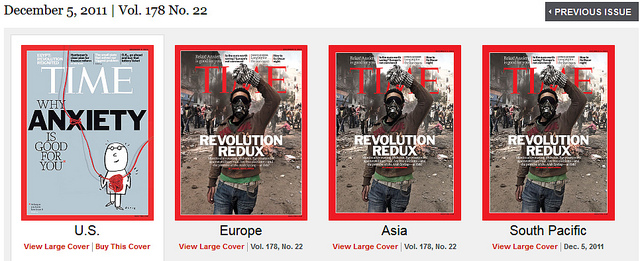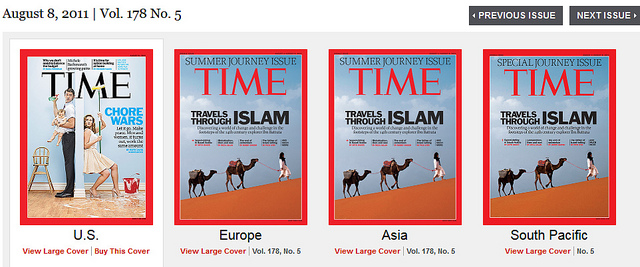|
America gazing at its navel
Ken Hechtman writes:
Re our discussion in “Us and Muslims,” apparently Time Magazine agrees with you. They don’t think Americans should pay attention to other peoples’ politics either.Mr. Hechtman linked an article at The Daily Kos in which several sets of Time Magazine covers are reproduced:
Each week, TIME Magazine designs covers for four markets: the U.S., Europe, Asia and the South Pacific. Often, America’s cover is quite, well — different. This week offers a stark example. 
Yes, what you see is TIME devoting its cover in international markets to a critical moment in Egypt’s revolution—perhaps the most important global story this week—while offering Americans the chance to contemplate their collective navels (with a rather banal topic and supposition, to boot). 
LA replies:
That is stunning. However, the issue I raised in “Us and Muslims” wasn’t whether we should pay attention to “other people’s” politics, but whether, in a well-ordered world, we would need to pay attention to Islamic politics. Obviously, given the actual state of affairs, we do need to pay attention to them. But the Time Magazine covers are symptomatic of another problem: that the U.S. media really does ignore the rest of the world.
Those Time magazine covers would be more telling if not for a couple of factors. First, the international story on the cover of the non-US editions of Time is included in the US edition as well, it just isn’t the cover story, so the US audience isn’t deprived of those international stories. Second, the audience for the non-US editions of time consists of Americans as well - American expatriates. No non-Americans read Time (very slight exaggeration). Liberal mainstream media is globalist, but they still need to sell magazines, and Americans are someone less interested in international affairs than are nationals of other countries (especially Europeans), therefore the choice of cover story.LA replies:
Of course those articles were published in the magazine, even if they were not featured on the cover. But, beyond the symbolism of the magazine covers, I was speaking of the U.S. media as a whole, and their ignoring of foreign affairs. A big exception to this is the New York Times, which has extensive coverage of events and developments in other countries. But as far as TV news and most newspapers are concerned, it’s as though the non-American part of the globe doesn’t exist, unless the U.S. is directly involved there.Kristor writes:
The less the American media tell Americans about events and living conditions in other countries, about their customs and cultures, the less Americans will resist the immigration of those cultures to America. This omission creates an immense lacuna in the American understanding of what threatens us, and a profound naiveté about our capacity to withstand it. So we are complacent. That’s just what Time wants. Time wants us to be anxious and worried about the power and greed of American capitalism and the tyrannical danger of American military and intelligence capabilities; Time wants us to obsess over the poisons in our atmosphere and the danger of having too many kids, not the waves of immigrants arriving from increasingly powerful and wealthy foreign countries. Time wants us to be horrified at the idea that anyone might discriminate against foreigners on account of their strange and—to our culture—lethal ways.AM writes:
I think the Time magazine covers can be explained more benignly. Time is principally an American magazine, so it’s American readers expect and want a more domestic focus, just as say, German readers of Der Spiegel would. If the readers of the non-U.S. editions are buying a foreign magazine, they probably want more “foreign” focus as well, just as the English version of Der Spiegel probably has a more global focus as well. American readers buying foreign magazines tend to want more foreign content, and the same is likely true for Europeans, Asians, etc. They are probably also smarter, better educated and wealthier than their countrymen who opt for local magazines. Liberals like to think Americans are much more provincial than Europeans, but I’ve seen little real evidence of this.Timothy A. writes:
By way of comparison, I decided to look at covers of the principal newsweekly in Italy, L’espresso (center-left politics). The first year I found was 2009.LA replies:
That’s surprising, especially as the affairs of European countries are so intertwined now.Douglas W. writes:
The discussion of TIME magazine reminded me of this hilarious video from the Onion titled “Time Magazine Announces New Version of Magazine Aimed At Adults.”James R. writes:
You wrote: Posted by Lawrence Auster at November 26, 2011 12:37 PM | Send Email entry |